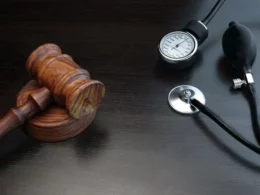Medical negligence cases in Ireland have become an important topic of discussion due to the considerable payouts awarded to the affected individuals. The average payout for medical negligence in Ireland can vary greatly, as the compensation amount depends on factors such as the severity of the harm or injury, the impact on the patient’s life, and the associated costs like medical bills and loss of earnings.
Over the past few years, the payouts for medical negligence cases in Ireland have been on the rise, garnering attention from healthcare professionals, legal experts, and the public alike. As with any legal matter, understanding the claim process, the roles and responsibilities of medical professionals, and the legal aspects of medical negligence are essential to navigate the complex landscape of healthcare in Ireland.
Key Takeaways
- The average payout in medical negligence cases can vary based on several factors, including the severity of the harm or injury and the impact on the patient’s life
- Understanding the legal aspects and the claim process is crucial for achieving a fair resolution in medical negligence cases
- The roles and responsibilities of medical professionals, along with the wider impact of medical negligence, remain critical areas of concern in Ireland.
Medical Negligence in Ireland
In Ireland, medical negligence cases occur when healthcare professionals such as doctors, nurses, or other staff working in hospitals or clinics breach their duty of care, resulting in injury or harm to a patient. The State Claims Agency handles these claims related to clinical care, representing various healthcare institutions, including the Health Service Executive.
The amount paid out for medical negligence claims in the country can vary greatly depending on the specific circumstances and severity of the case. In 2020, the State paid out almost €315 million in damages in settlements for medical negligence claims, along with associated legal costs. During the first nine months of the same year, the amount paid out by the State Claims Agency was over €265 million in relation to clinical care.
When filing a medical negligence claim, it’s crucial to follow the legal process in Ireland, which may involve seeking legal advice, gathering evidence, and proving the medical professional’s negligence. This process can be time-consuming and emotionally challenging, but it is essential to ensure fair compensation for the harm caused by the negligence.
Throughout the process, it’s essential to consider the legal costs involved. These costs will vary depending on the complexity of the case and the fees charged by various legal firms representing the claimants and defendants. In 2020, the top ten named legal firms representing the agency in medical negligence cases individually billed for different amounts and number of cases.
It is worth noting that taking a medical negligence claim to the Irish courts may result in additional legal fees and court costs. A medical negligence settlement decided by a judge might be significantly different from a settlement offered by an insurance company, as mentioned in this source.
In summary, medical negligence in Ireland is a serious issue that requires a thorough understanding of the legal process and potential compensation payouts. The average payout for medical negligence can vary greatly depending on various factors, including the severity of the case and the legal costs.
What You Should Know About the Payouts and Compensation
In Ireland, reaching a settlement for medical negligence usually involves two types of damages: general damages and special damages.
General damages are awarded to compensate you for the pain, suffering, and loss of amenity you experienced due to the negligence. This amount is not fixed and can vary greatly depending on the severity of your injury and the impact it had on your life.
Special damages cover your financial losses, such as medical bills, loss of earnings, and any expenses incurred as a result of the negligence. These damages can include past and future costs related to the injury.
The average payout for medical negligence in the UK is £50,000. However, the average payout in Ireland might differ, and it can significantly vary from case to case based on the factors mentioned above.
When determining the appropriate compensation for your claim, various factors are considered. The extent of your injury, how it has affected your daily life, and whether you will need ongoing care or assistance due to the negligence all play a role in determining the amount of compensation you may receive. Additionally, your age, earning capacity, and the level of care required in the future can also impact the final settlement amount.
Remember that medical negligence claims are often complex and require thorough analysis. Thus, it is essential that you seek legal guidance from experienced solicitors to ensure you receive a fair and just settlement for your damages.
Please note that seeking an accurate payout number for Ireland may require further research. Keep in mind that each case is unique, and your compensation claim will depend largely on the specific circumstances surrounding the negligence and your individual losses.
Cases of Medical Negligence
Medical negligence cases can involve various types of injuries and errors, ranging from misdiagnosis to surgical mistakes. In this section, we will explore some common types of medical negligence cases, including birth injuries, brain damage, cerebral palsy, medication mistakes, and death.
Birth injuries are some of the most common and heart-breaking medical negligence cases. They encompass a wide range of complications that may arise during pregnancy, labor, or delivery, causing harm to both the mother and the baby. Some birth injuries, like cerebral palsy, can have severe and lifelong consequences. In such cases, you may be eligible to claim compensation for the hardship faced by you and your child.
Brain damage is another type of medical negligence claim. Often, brain damage occurs due to a delay in diagnosing or treating a medical condition, such as a stroke or a brain tumor. In these cases, early diagnosis and treatment are crucial to prevent further harm. The consequences of brain damage can be far-reaching and life-changing, making compensation claims essential for those affected.
Cerebral palsy is a neurological disorder caused by brain injury during pregnancy, labor, or delivery. Medical negligence resulting in cerebral palsy could stem from a lack of oxygen during the birthing process or medical errors causing brain damage. Compensation claims for cerebral palsy can cover the lifelong support, therapy, and care needed for the affected individual.
Misdiagnosis and delay in diagnosing are common medical negligence cases, often occurring when physicians fail to identify a critical condition or diagnose the wrong ailment. These errors can lead to inadequate or harmful treatments, exacerbating an existing condition or delaying essential care. Examples include the misdiagnosis of cancer or a delay in diagnosing a heart attack.
Surgical errors can also become grounds for medical negligence claims. Such mistakes may include wrong-site surgery, incorrect procedure, or errors leading to postoperative complications. Most surgical errors can have severe consequences, posing threats to a patient’s health and wellbeing.
Lastly, medication mistakes, such as incorrect prescriptions or dosage, can have severe side effects and lead to further health complications. In certain cases, these errors could result in the death of a patient. Families affected by the loss of a loved one due to medication errors may be entitled to compensation for their loss and suffering.
It is important to understand the complexities surrounding medical negligence cases, be aware of your rights, and seek professional advice if you believe you or your loved ones have been affected by these errors.

Legal Aspects of Medical Negligence in Ireland
When dealing with medical negligence cases, various legal entities and aspects come into play. As a victim of medical negligence, it is important to understand the legal framework in Ireland to successfully navigate the process and seek compensation.
Firstly, it is crucial to engage the services of a competent medical negligence solicitor, who can offer expert legal advice and handle all aspects of the case. Your solicitor will help you determine the merits of your case, navigate complex medical and legal issues, and ensure compliance with the relevant laws.
In addition to hiring a solicitor, you must be mindful of the litigation process. Medical negligence cases often involve lengthy court proceedings, during which both plaintiffs and defendants will be represented by legal counsel. It is important to be well-prepared and patient, as the legal process can be time-consuming and complicated.
A significant aspect of medical negligence cases is determining liability. Establishing liability requires proving that a healthcare professional or institution failed to provide a reasonable standard of care, which directly led to the harm or injury suffered. Your solicitor will assist you in gathering the necessary evidence and expert testimony to support your claim.
Throughout the process, you should be aware of the legal costs and fees involved. Medical negligence cases can result in substantial legal fees due to the complexity of the issues and the length of court proceedings. However, some solicitors may offer a “no win, no fee” arrangement, minimizing financial risks for the plaintiff. It is essential to discuss the fee structure with your solicitor before proceeding with your case.
In summary, when pursuing a medical negligence claim in Ireland, it is vital to consider the legal aspects, such as engaging a skilled medical negligence solicitor, understanding the litigation process, establishing liability, and being aware of legal costs and fees. By staying informed and prepared, you can better navigate the challenging landscape of medical negligence cases and improve your chances of a favorable outcome.
Claim Process for Medical Negligence
When you believe you have experienced medical negligence in Ireland, it is essential to understand the claim process to ensure your rights are protected. This section will outline the steps involved in making a clinical negligence claim and provide you with the necessary information to make an informed decision.
First, you should consult with an experienced solicitor specializing in medical malpractice or clinical negligence. They will be able to assess your case, provide valuable insight into your chances of success, and guide you through the process. Gathering evidence and medical records related to your alleged negligence incident is crucial for building a strong case.
Next, your solicitor will need to secure expert medical opinions to support your claim. This involves retaining independent medical experts who can provide unbiased evaluations of your case. They will serve to further strengthen your claim against the defendant and help establish a causal link between their actions and your injury.
Once the necessary evidence has been gathered and expert opinions secured, the negotiation process begins. Your solicitor will present your case to the defendant’s legal team or their insurer and then engage in negotiations on your behalf. It is essential to manage your expectations during this stage, as the compensation amount will depend on the severity of your injury, the impact on your life, and the negligence involved.
It is important to note that most medical negligence claims in Ireland are settled out of court through negotiations. However, if a fair settlement cannot be reached, your solicitor may advise taking the case to court. Going to court can be a lengthy and challenging process, but with the right legal representation, your chances of success can increase significantly.
During this entire process, communication with your solicitor is vital. They will keep you informed of any developments in your case, answer any questions you may have, and provide guidance on the best course of action for your specific circumstances. By following the steps outlined here, you will be better equipped to navigate through the claim process for medical negligence in Ireland successfully.
Roles and Responsibilities of Medical Professionals
As a medical professional, your primary responsibility is to provide the proper standard of care to your patients. This involves ensuring that the treatment and services you offer meet the expectations of a competent healthcare professional in your field. Doctors and other healthcare staff play a crucial role in the overall well-being of their patients, and it is essential to always uphold the highest standards when performing your duties.
One of the key aspects of delivering quality care is maintaining accurate and up-to-date medical records. These records are vital in guiding your diagnosis, treatment, and management of patients’ conditions. They also provide a means of communication between different healthcare providers involved in a patient’s care. It is your duty to ensure that these records are comprehensive, legible, and secure to facilitate smooth coordination among medical professionals.
In addition to maintaining records, open disclosure is another essential component of a healthcare professional’s role. This means being transparent with your patients regarding their diagnoses, treatment options, and progress. Open communication helps to build trust and fosters a strong therapeutic relationship, ultimately contributing to better patient outcomes.
It is vital to remember that as a medical professional, you have a legal and ethical obligation to:
- Obtain informed consent before conducting any medical interventions or procedures
- Prescribe medications appropriately and responsibly
- Monitor the progress of your patients and adjust their care plans when necessary
- Advocate for patients’ best interests and respect their rights and autonomy
- Maintain patient confidentiality and handle their personal information with care
By diligently fulfilling these roles and responsibilities, you can help ensure the safe and effective care of your patients. Moreover, you minimize the risk of medical negligence claims, protecting both your patients and yourself from negative consequences.
Impact of Medical Negligence
The consequences of medical negligence can be profound, affecting various aspects of your life. One of the primary impacts is the pain and suffering you may experience as a result of the negligent care. This includes not only physical pain but also the emotional and psychological distress associated with the incident.
Another significant impact is the potential loss of earnings due to your inability to work or reduced capacity to perform your job duties. This can be a substantial financial burden, especially if you have dependents relying on your income.
The financial impact of medical negligence extends beyond lost wages. You may also incur additional expenses such as medical bills for ongoing treatment, rehabilitation, and care required to address the injuries sustained. Furthermore, the cost of adapting your home to accommodate any mobility or accessibility needs can add to the financial strain.
Medical negligence can also lead to a loss of amenity, which means the loss of enjoyment or quality of life due to your inability to participate in activities that you once enjoyed. This can have a significant impact on your overall happiness and wellbeing.
Depending on the nature and severity of the negligence, a range of specific injuries can arise. These include birth injuries, which can result from improper prenatal care or mistakes made during childbirth. Severe cases can lead to brain damage or conditions like cerebral palsy being diagnosed in the affected child, having a lifelong impact on their development, capabilities, and overall quality of life.
In the most unfortunate circumstances, medical negligence can lead to death. This is not only a devastating loss for the individual’s loved ones but also a source of significant financial and emotional strain on the surviving family members.
In conclusion, the impact of medical negligence is substantial and far-reaching, affecting various facets of an individual’s life and overall well-being. Compensation claims aim to alleviate some of the financial and emotional burdens experienced by victims of medical negligence, helping them to rebuild their lives and move forward.
Medical Negligence Across Ireland
In recent years, medical negligence cases in Ireland have led to significant payouts. The State paid out almost €315 million on medical negligence claims in a single year. It is essential for you to be aware of the scale and impact of these cases throughout the country, including in major cities like Cork and Galway.
Between 2014 and 2019, the Health Service Executive (HSE) paid over €832 million for medical negligence cases. In the first nine months of a particular year, the cost of medical negligence payments reached over €265 million. These figures indicate the extent of the issue and the need for improved practices in the healthcare system across Ireland.
While the average payout for medical negligence claims can vary depending on the specific circumstances of each case, it is crucial to recognize that these payouts are intended to help victims regain the quality of life they had before the negligence occurred. As an individual seeking information about medical negligence payouts, it is essential to consult legal experts to gain a better understanding of your entitlements in case of a medical negligence incident.
It is vital to acknowledge the potential risks of medical negligence not just in Ireland as a whole, but also in specific cities such as Cork and Galway. Being informed can help ensure that you choose healthcare providers and medical facilities with a strong commitment to patient safety and best practices.
In conclusion, medical negligence is an important issue across Ireland, as demonstrated by the high payouts in recent years. As a patient or family member, it is crucial to be aware of the potential risks in your area and to act proactively in finding the best healthcare options available.
Concerns and Challenges in Medical Care
Ireland’s healthcare system faces various challenges and concerns, which directly impact medical negligence cases. Among these are funding issues, difficult working conditions, staff shortages, lack of care, and instances of neglect.
Funding challenges are common, resulting in scarce resources and insufficient equipment to manage the increasing demand for high-quality healthcare. As a result, the healthcare system struggles to provide adequate care to all its patients. Thus, your interactions with healthcare providers may be impacted by funding limitations, which raises the potential for medical negligence to occur.
Working conditions for medical professionals in Ireland can be difficult, with long hours and stressful work environments. These conditions ultimately lead to fatigue, burnouts, and mistakes in medical care. When healthcare professionals are overworked, the risk of medical negligence increases, directly affecting your treatment and overall patient experience.
Moreover, staff shortages can contribute to medical negligence instances. Due to the limited availability of trained professionals, you may face longer waiting times and reduced attention from your healthcare providers. In such situations, there is a higher possibility of misdiagnoses, incorrect prescriptions, treatment delays, and diminished care quality.
Lack of care becomes a concern when healthcare providers fail to meet the required standard or when patient safety is compromised. Issues such as improper hygienic practices, miscommunication between healthcare providers, and administrative negligence are factors that could impact your treatment. These factors can lead to tragic consequences, and in some cases, medical negligence claims.
Lastly, neglect, whether intentional or unintentional, is a critical concern in the Irish healthcare system. Neglect may arise from healthcare providers not adequately addressing your medical needs, taking shortcuts, or ignoring standard protocols. This neglect has the potential to result in severe medical negligence cases with lasting implications on your health and well-being.
In conclusion, it is essential to recognize the concerns and challenges in Ireland’s healthcare system to stay vigilant and informed. By understanding these factors, you can take appropriate steps to ensure your safety and promote awareness about medical negligence, ultimately contributing to improvements in the Irish healthcare system.
Insurance and Medical Negligence
When dealing with medical negligence cases, it is essential to understand the role of insurance companies in compensating the victims. In Ireland, medical professionals, including doctors, nurses, and hospitals, are required to hold insurance coverage to protect themselves and their patients in case of malpractice or negligence.
Medical negligence cases can be complex, and determining the average payout can be challenging. The compensation amount varies depending on factors such as the severity of the negligence, the extent of the injury, and the impact on the patient’s life. In general, medical negligence payouts consist of two main components: general damages and special damages.
General damages refer to the compensation you receive for the pain, suffering, and loss of amenity caused by the negligence. These damages are usually difficult to quantify, but they can be estimated based on the nature of the injury and its consequences on your daily life.
Special damages cover any financial losses or expenses you have incurred as a result of the medical negligence. This can include:
- Medical bills
- Lost wages due to time off work
- Rehabilitation costs
- Travel expenses to and from medical appointments
- The cost of any necessary adaptations to your home
- Care and assistance costs, if you need ongoing support
As you can see, calculating the average payout for medical negligence in Ireland can be quite complex, given the various factors to consider. It is highly recommended to seek professional legal advice when pursuing a medical negligence claim. Expert solicitors can guide you through the process, gather evidence, and negotiate with the insurance company on your behalf to ensure that you receive adequate compensation for the harm you have endured due to medical negligence.
Frequently Asked Questions
What factors determine compensation in medical negligence cases?
In medical negligence cases, various factors determine the compensation amount. These factors include the severity of the injury or harm, the long-term consequences of the injury, loss of earnings or future earning capacity, and the cost of past and future medical care. Emotional distress may also be considered in some cases.
How are damages calculated in medical negligence claims?
Damages in medical negligence claims are calculated by assessing the financial and non-financial losses sustained by the claimant. Financial losses may include medical expenses, potential loss of earnings, and other out-of-pocket expenses. Non-financial losses can include pain and suffering, emotional distress, and loss of enjoyment of life. The goal is to compensate the victim for these losses and help return them to their pre-injury state.
What is the typical timeframe for resolving a medical negligence case in Ireland?
The timeframe for resolving medical negligence cases in Ireland varies depending on the complexity of the case, availability of evidence, and the court system’s workload. Generally, such cases can take anywhere from 18 months to several years to reach a conclusion. However, some cases may settle faster through negotiation or mediation processes.
Are there any recent examples of medical negligence payouts in Ireland?
In recent years, there have been several high-profile medical negligence payouts in Ireland. For instance, almost €315 million was paid out in damages and associated legal costs in 2020. It is important to note that each case is unique, and payouts can vary significantly based on individual circumstances.
What is the process for pursuing a medical negligence claim?
To pursue a medical negligence claim in Ireland, you must first consult with a solicitor experienced in medical negligence cases. They will help you assess the merits of your case, gather evidence, and draft legal documents. Once the claim is filed, you may engage in negotiation, mediation, or court proceedings to reach a resolution. Throughout the process, your solicitor will provide guidance and representation.
What are the limitations and requirements for filing a medical negligence claim in Ireland?
In Ireland, there are specific limitations and requirements for filing a medical negligence claim. Generally, you must commence the claim within two years from the date of the injury or knowledge of the injury. You will also need to provide evidence of negligence and establish a causal link between the negligence and your injury or harm. Additionally, you will need expert medical opinion supporting your claim. A solicitor with experience in medical negligence can help you navigate these requirements and ensure your case is filed within the appropriate time frame.
YOU SHOULD ALSO READ:
- Is It Legal to Amputate a Healthy Limb? Exploring the Ethics and Legalities
- Is It Legal to Euthanize a Healthy Dog? A Clear and Neutral Answer
- How Many Times Can You Appeal a Medical Claim? Explained
- What Are The Elements of a Medical Negligence Claim
- How Much Compensation Can You Claim for Death by Medical Negligence?
- Medical Negligence and Consumer Protection Act: What You Need to Know
- What Are The 5 Common Medical Negligence Cases?












